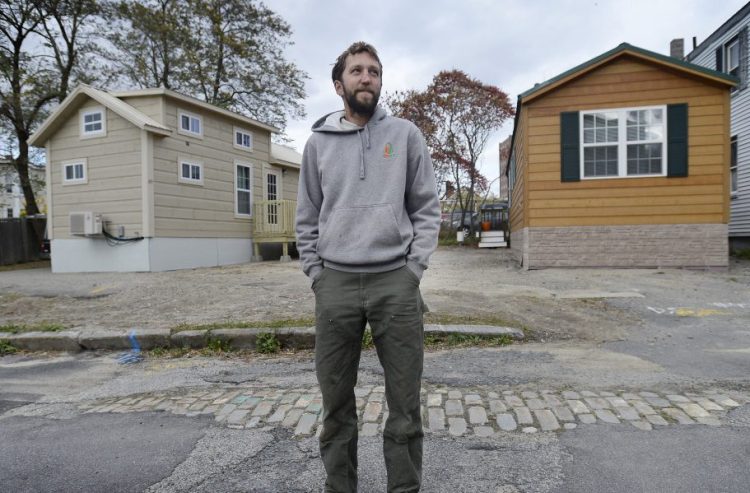A Portland landowner has agreed to remove two tiny homes from a parking lot in Bayside after being taken to court by the city.
Brent Adler, the principal of Federal Street Phoenix LLC, also agreed to pay a $1,000 fine for placing the tiny homes on trailers on his Chapel Street parking lot with the goal of renting them out, and for not having the necessary permits.
As the settlement was reached May 5 in the case of Adler’s tiny homes, the city also moved to adopt a new ordinance setting clear rules against the use of recreational vehicles as dwelling units in the city.
Adler said he is trying to sell the homes, which cost him $175,000.
“If I am not successful selling them, I will relocate them to another piece of land outside of Portland,” Adler said. He also said he has applied for a building permit to keep one tiny home there on a traditional foundation, rather than a trailer.
“I will continue my efforts to apply for the appropriate permit on my property, and I can see no legal reason why there should be any delay,” Adler said.
“When the city is able to make discretionary decisions which help large-scale developers, it would be only fair to have the same rules and predictability apply to all permit applications for small development.”
Last fall, Adler said he planned to rent the 400-square-foot home at 47 Chapel St. for $1,100 a month and the 380-square-foot home at 49 Chapel St. for $850 a month.
“We’re pleased that we were able to reach an agreement on this matter,” City Hall Communications Director Jessica Grondin said. “Once again, our enforcement of this issue was always about compliance with public safety regulations and not about the presence of tiny homes in Portland.”
The city filed a complaint in Portland District Court after Adler did not comply with an Oct. 21 notice of violation, demanding that he remove the structures. Adler placed the homes on his Chapel Street lot last fall after running electricity, water and sewer service to the lot. He received permits for the utilities, but he never received the city’s permission to put the tiny homes on the lot and rent them out.
The lawsuit alleged six ordinance and code violations, including moving a building without a permit, failure to receive an occupancy permit, failure to register rental units with the city, and having rental units that do not comply with the International Residential Code regarding foundations.
The city asked the court to order the removal of the homes and levy a minimum penalty of $100 per violation per day beginning last Oct. 12, as well as reimbursement of costs and fees to the city.
The settlement agreement the two sides reached May 5 gave Adler seven days to disconnect all utilities to the homes. Adler has until July 3 to remove the structures.
“By no later than July 3, 2017, (Adler) shall remove the trailer homes from the property and city limits. (He) shall not place the trailered homes anywhere … within the city without appropriate permits issued by the city,” the settlement states.
Adler is not admitting to any violations, according to the settlement.
The settlement comes as the city seeks to clarify its ordinance on the issue.
On Wednesday, the City Council’s Housing Committee recommended a new ordinance explicitly making it illegal for people to live in recreational vehicles, campers or trailered homes.
Adler had contended that he did not need permits from the city because his tiny homes were actually recreational vehicles with a motor vehicle registration, and that the city did not have any regulations around RV parks. He also contended that they complied with life safety requirements.
However, Michael Russell, the city’s director of permitting and inspections, said in an email last fall to the Portland Press Herald that RV parks are not addressed in the code and are therefore prohibited.
“Any use that is not specifically allowed in the zoning ordinance is disallowed,” Russell said.
The ordinance recommended by the Housing Committee would prohibit so-called recreational shelters from being occupied for more than 30 days in any year. Neither the shelter nor property on which the shelter is located could be rented or let, and no more than one shelter could be located on a single property, according to the ordinance.
For someone to be able to stay in the shelter, it would have to be fully inspected, registered and ready for highway use. It would also need to meet all applicable fire and life safety requirements, among other rules.
Grondin noted that the city has also received complaints about people living in a camper in Sumner Court on Munjoy Hill.
“Because of the gray area within the existing code, we wanted to clarify what the rules are and also allow reasonable uses of RVs in the city,” she said.
Send questions/comments to the editors.




Comments are no longer available on this story